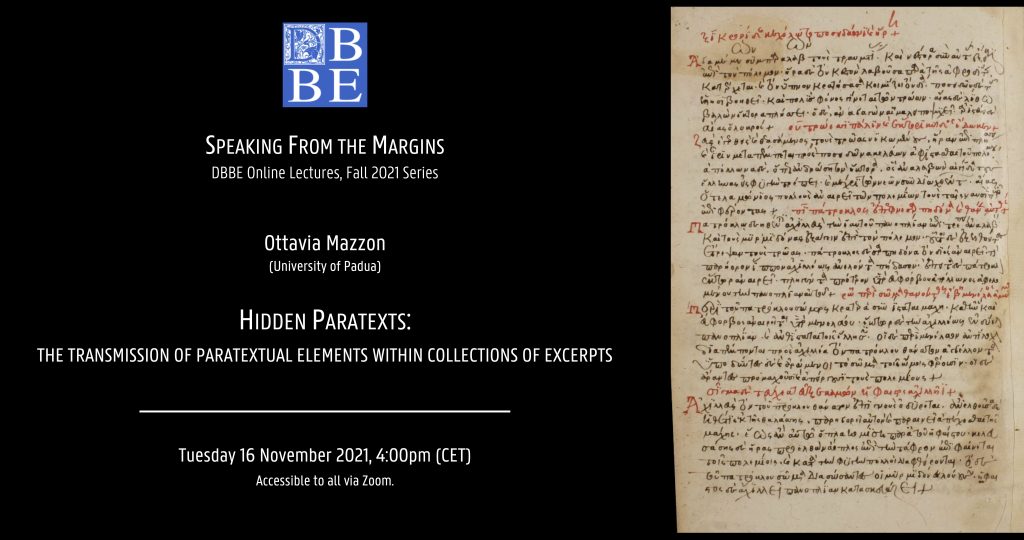The third lecture in the online lecture series Speaking From the Margins. DBBE Online Lectures, Fall 2021 Series will be given by Ottavia Mazzon (University of Padua).
Ottavia Mazzon is currently Frances A. Yates Long-term Fellow at the Warburg Institute and a post-doc researcher at the University of Padua. Her research interests lie at the intersection of classical philology and book history, focusing on the readership and material reception of ancient Greek literature in Byzantium and in Renaissance Europe. Her first monograph, Leggere, selezionare e raccogliere excerpta nella prima età paleologa. La silloge conservata nel codice greco Neap. II C 32, is forthcoming with Edizioni dell’Orso (Hellenica, 99).
Abstract
Byzantine intellectuals frequently put together collections of excerpts aiming to preserve the most interesting passages they encountered while reading. Many of these have survived, especially from the Palaeologan period, allowing us to explore Byzantine scholars’ reading interests and to understand how they used their books. Whenever they read, Byzantine scholars did not exclusively focus on literary works they were studying. When consulting a codex, they also took notice of the paratexts and sometimes ended up transcribing them alongside the quotations they had selected from the main text; the paratexts thus became an integral part of excerpt collections.
The objective of my paper is to show how the DBBE is an effective tool for the identification of paratextual elements within an excerpt-collection and facilitates the reconstruction of the material characteristics of the manuscripts read by the excerptor(s), going so far as providing essential information for the recognition of the exemplar employed. I will do so by presenting examples from two excerpt collections from the early Palaeologan period which I have chosen as a case-study: the Rhodoniai of Makarios Chrysokephalos, preserved in MS Marc. gr. Z. 452 (coll. 796), and the excerpt-collection transmitted by MS Napoli, Biblioteca Nazionale, II C 32. The book epigrams preserved in the latter are partially known; Neap. II C 32 contains a poem summarizing the content of the Iliad, which accompanies the hypotheseis to each book (ff. 366r-371v).
Practical information
Date & time: Tuesday 16 November 2021, 4:00pm (CET)
No registration required. The lecture is freely accessible via Zoom: https://ugent-be.zoom.us/j/96553291684?pwd=SyticTAxYmpLVy9sYm5RNzFHYUJjQT09.
- Meeting ID: 965 5329 1684
- Passcode: 8u5s8CW3
N.B.: A Zoom account is required to join this meeting. Please make sure to be logged in, using your Zoom credentials.
